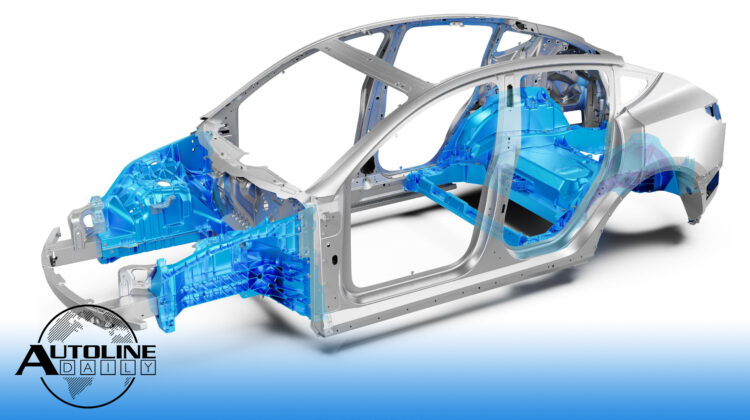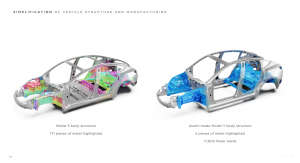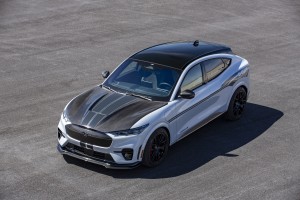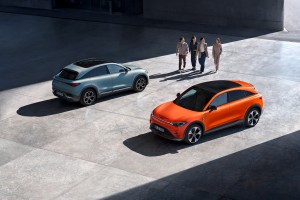
Listen to “AD #3555 – OEMs Racing to Copy Tesla Gigacastings; Shelby Mach-E Not Sold in U.S.; MB EV Owners Pay For Performance” on Spreaker.
Follow us on social media:
Runtime:10:05
0:00 OEMs Racing to Copy Tesla Gigacastings
1:17 Honda Lines Up TSMC Chip Supplies
2:07 Rolls-Royce Expands Bespoke Ops
3:11 Porsche Wants Recycled Rare Earths
3:49 Shelby Mach-E Not Sold in U.S.
5:13 Smart Comes Out with Bigger Car
7:15 Mercedes Offers Performance Via Subscription
8:07 Aurora & Continental Have AV Tech for Trucks
Visit our sponsors to thank them for their support of Autoline Daily: Bridgestone, Intrepid Control Systems, and Schaeffler.
This is Autoline Daily, the show dedicated to enthusiasts of the global automotive industry.
OEMs RACING TO COPY TESLA GIGACASTINGS
Tesla shocked the auto industry when it started using gigacastings on the Model 3 and Y, because it’s such a new and novel way to make the structure of a car, at least with castings that big. Several automakers rushed in to copy the idea, including Geely which is using them for the rear end structure on its Zeeker 009 luxury van. Volvo, which is also part of Geely, is going to use them on a future EV platform. XPeng will use them on its upcoming G6 SUV. Cadillac is using them on the hand-built Celestiq. And Reuters reports that Toyota is exploring them. GM and Toyota are looking at using somewhat smaller castings to make it easier to repair a vehicle after an accident. But no doubt every automaker is studying large castings. Tesla says its front and rear gigacastings eliminate 140 stampings, while Zeeker says they eliminate 800 spot welds. That kind of manufacturing efficiency is too big to ignore.
HONDA LINES UP TSMC CHIP SUPPLIES
Automakers don’t want to go through another chip shortage, ever again. That’s why Honda is forming a strategic alliance with the Taiwan Semiconductor Manufacturing Company or TSMC, which is the largest chip manufacturer in the world. TSMC also introduced new software that will speed up chip production for automakers. Automotive chips take longer to make than chips for consumer products because they need to be more rugged. It’s what you typically hear referred to as automotive grade. TSMC says the software allows automakers to design chips two years faster and let them use state of the art chip making technology. But it won’t be available until 2025.
ROLLS-ROYCE EXPANDS BESPOKE OPS
How do you grow your business if you’re Rolls-Royce? Not by making a bunch more cars, you lose your exclusivity. So, instead, Rolls is going to expand its Bespoke and Coachbuild operations at its assembly plant in Goodwood, England. But by offering customers more opportunity to customize their cars, it’s going to more than recoup that money. Customers pay a lot more for bespoke cars and custom coachwork.
PORSCHE WANTS RECYCLED RARE EARTHS
Porsche is on the hunt for more rare earth minerals for EV motors and thinks that recycling is the answer. While there are alternative ways of making motors that don’t use as much rare earths, or even none at all, Porsche wants rare earths to make the most powerful and efficient motors for its sports car customers. By 2040, demand for EV motors is estimated to be 20-times what it was in 2018. And the materials are also used in other products, like wind turbines. So, Porsche is conducting “intensive research” in new recycling methods.
SHELBY MACH-E WON’T BE SOLD IN U.S.
I’d bet many people associate the Shelby name with performance Mustangs. And now Shelby is going electric. It’s coming out with a performance package for the Mustang Mach-E GT. Oddly, it’s only available for Europe and will be limited to 100 examples. Shelby says this is because sales of EVs and public charging are growing more rapidly in Europe compared to the U.S. Anyway, upgrades include carbon fiber hood, grille, front splitter, mirror covers and lower door trim, lighter aluminum wheels, striped graphics and a handling package that it says lowers the Mach-E by over an inch, but it doesn’t provide any details. Oh, and one other thing, it’s not going to sound like an EV at all. It’s going to feature Borla’s Active Performance Sound System, which in this video from Borla makes a Mach-E sound like it’s got a massive V8 under the hood. The system uses data, like speed and throttle position, to match the sound with what the vehicle is doing. In the demo vehicle a speaker was mounted under the car, but we’re not sure if that’s how it will be on the Shelby Mach-E, which costs nearly 25,000 euro on top of the original purchase.
SMART COMES OUT WITH BIGGER CAR
Smart used to only build dinky, little cars that never sold very well. But that’s changing. Meet the Smart #3, which is a larger 4-door model and it just debuted in China. The name is a little confusing. It’s the second car in its lineup and the first is called the #1. Anyway, the standard model comes with a 200-kW or 268 horsepower electric motor mounted at the rear. The performance Brabus version is four-wheel drive and has a combined 315-kW or 422 horsepower. It can move from 0 to 100 km/h in 3.6 seconds. It has a range between 500 to 540 kilometers or 310 to 335 miles based on the Chinese Light Duty Test Cycle. As you may remember, Smart is now a joint venture between Mercedes and Geely. Mercedes handled the design while the car is based on Geely’s SEA platform that’s also used for the Lotus Eletre, the Volvo EX90 and the Zeekr 001 among others. The #3 launches in China in June with a starting price of $30,300 and it goes on sale in Europe early next year.
MERCEDES OFFERS PERFORMANCE VIA SUBSCRIPTIONS
Mercedes is going to make you pay for performance. You may remember us reporting that Mercedes was going to start charging EV owners in Europe if they wanted to unlock more performance from their cars. Now it’s coming to the U.S. Owners of the EQE and EQS, both the sedan and SUV, can pay a monthly, yearly or lifetime fee to unlock as much as 80 horsepower and reduce the 0-60 time as much as a second. Here’s a chart that shows what owners get and how much they have to pay. Monthly subscription is $60 or $90 depending on the model, while the lifetime unlock fee is $2,000 or $3,000. But would you do this? Pay a fee to unlock more performance from your car?
AURORA & CONTINENTAL HAVE AV TECH FOR TRUCKS
Speaking of subscription services, Aurora, the autonomous technology company, is joining forces with Continental to deliver fully autonomous driving systems for long-haul commercial trucks in the United States. Aurora will develop the software, while Continental will supply the hardware, and they expect to bring their system to market in 2027. They say that on long-haul trips like from LA to Dallas, their system will improve fuel economy 10% and that delivery time will be three times faster compared to using a human driver. Interestingly, they’re going to offer this as a service, where customers will pay for the system based on how many miles they drive.
RETHINKING THE ENTIRE TRANSPORTATION LANDSCAPE
Speaking of autonomy and mobility, where is this all taking us? Are we on the verge of seeing the greatest change in how we move around since the first horseless carriages showed up over 120 years ago? Do you really need a 4,000 pound vehicle to get you where you’re going? Do you even need a car? That’s going to be the topic on Autoline After Hours later today. We’ll have Dan Sturges, the author of Near To Far, a book on sustainable mobility. Mike Austin from Guidehouse Insights will also be on the show. So join John and Gary when we go live at 3 pm eastern time right here at Autoline.
And that brings us to the end of today’s show. Thanks for tuning in.
Thanks to our partner for embedding Autoline Daily on its website: WardsAuto.com
Seamus and Sean McElroy cover the latest news in the automotive industry for Autoline Daily.












